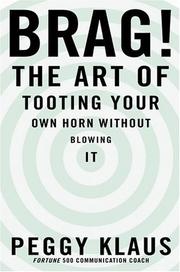| Listing 1 - 6 of 6 |
Sort by
|

ISBN: 0446531790 Year: 2003 Publisher: New York Warner
Abstract | Keywords | Export | Availability | Bookmark
 Loading...
Loading...Choose an application
- Reference Manager
- EndNote
- RefWorks (Direct export to RefWorks)
Book
ISBN: 0674036883 Year: 2003 Publisher: Cambridge, Massachusetts : Harvard University Press,
Abstract | Keywords | Export | Availability | Bookmark
 Loading...
Loading...Choose an application
- Reference Manager
- EndNote
- RefWorks (Direct export to RefWorks)
At least since Descartes, philosophers have been interested in the special knowledge or authority that we exhibit when we speak about our own thoughts, attitudes, and feelings. Expression and the Inner contends that even the best work in contemporary philosophy of mind fails to account for this sort of knowledge or authority because it does not pay the right sort of attention to the notion of expression. Following what he takes to be a widely misunderstood suggestion of Wittgenstein's, Finkelstein argues that we can make sense of self-knowledge and first-person authority only by coming to see the ways in which a self-ascription of, say, happiness (a person's saying or thinking, "I'm happy this morning") may be akin to a smile--akin, that is, to an expression of happiness. In so doing, Finkelstein contrasts his own reading of Wittgenstein's philosophy of mind with influential readings set out by John McDowell and Crispin Wright. By the final chapter of this lucid work, what's at stake is not only how to understand self-knowledge and first-person authority, but also what it is that distinguishes conscious from unconscious psychological states, what the mental life of a nonlinguistic animal has in common with our sort of mental life, and how to think about Wittgenstein's legacy to the philosophy of mind. Table of Contents: Acknowledgments Introduction I. DETECTIVISM AND CONSTITUTIVISM 1. Detectivism 1.1. Old Detectivism 1.2. New Detectivism 1.3. A Dialogue 2. Constitutivism 2.1. "A Kind of Decision" 2.2. Interpretation and Stipulation 2.3. The Responsibility Objection 3. Between Detectivism and Constitutivism 3.1. Experience and the Logical Space of Reasons 3.2. The Middle Path 3.3. When a Dog Feels Pain 3.4. The Phantom Smell Objection 3.5. Back to Detectivism? II. EXPRESSION 4. Meaning, Expression, and Expressivism 4.1. Meaning 4.2. Expression 4.3. Expressivism 5. Authority and Consciousness 5.1. A Three-Paragraph Account of First-Person Authority 5.2. Other Varieties of First-Person Authority 5.3. Expression and Context 5.4. Conscious or Unconscious 5.5. Between Conscious and Unconscious 5.6. The Logical Space of Animate Life 6. Sensations, Animals, and Knowledge 6.1. "But Isn't the Beginning the Sensation--Which I Describe?" 6.2. "It Is Not a Something, but Not a Nothing Either!" 6.3. The Mental as Such 6.4. Self-Knowledge? Postscript: Deliberation and Transparency Abbreviations Used in This Book References Index This book is an important contribution to a group of problems which have a central place in philosophy of mind. Here I am taking "philosophy of mind" in a broad sense; Finkelstein's book and the problems he discusses have implications for philosophy of language, metaphysics, and epistemology. The book is written with intelligence and verve. Very few works in philosophy have anything describable as "narrative tension," but Finkelstein's certainly does. He draws the reader into the problems he is attempting to solve with the skill of a writer of detective stories; he leads his readers down paths that appear inviting, only then to demonstrate why the apparent solutions on offer down those paths won't do; and his arguments for the solution he himself offers at the end have the force, and the place in the book, of the denouement of a good thriller.--Cora Diamond, Professor of Philosophy, University of VirginiaThis is an excellent product of philosophical reflection.--Jennifer Hornsby, Professor of Philosophy, University of LondonWhat begins as a discussion of a somewhat suburban issue in the philosophy of mindâ€"the problem of first-person authorityâ€"turns out to have surprisingly far-reaching implications. Expression and the Inner brings out the fatefulness of a host of deeply entrenched assumptions about a wide range of philosophical topicsâ€"topics such as what it takes to understand an utterance or to read a facial expression, the relation between sentience and sapience, the nature of psychoanalytic discovery, and the character of an animal's mental life. Finkelstein shows that making sense of first-person authority requires that one give up these assumptions and that doing so transforms the entire landscape of philosophy of mind in a dramatically illuminating way. Many of the book's central arguments draw upon Wittgenstein's writings. It is a strange feature of contemporary philosophy of mind that Wittgenstein is usually taken to have been among the most significant philosophers of the twentieth century, and much of his writing concerns philosophy of mind, yet we have no good understanding of what the importance of his work for philosophy of mind really is. This book is a major contribution to filling that gap. In the scope of its reach, the extent of its ambition, the thoroughness of its conception, and the elegance of its presentation, it is an exemplary piece of philosophy.--James Conant, Professor of Philosophy, University of ChicagoThis delightful book takes the reader on an entertaining tour of some of the key issues in the philosophy of mind and language, while offering an appealing new account of self knowledge and consciousness. I loved this book!--Martha J. Farah, Professor of Psychology and Director of the Center for Cognitive Neuroscience, University of Pennsylvania

ISBN: 9780674011564 9780674030442 0674011562 Year: 2003 Publisher: Cambridge, Mass. Harvard University Press
Abstract | Keywords | Export | Availability | Bookmark
 Loading...
Loading...Choose an application
- Reference Manager
- EndNote
- RefWorks (Direct export to RefWorks)
Philosophical anthropology --- Self-knowledge, Theory of --- Self-presentation
Book
ISBN: 9173464708 Year: 2003 Publisher: Göteborg Acta universitatis Gothoburgensis
Abstract | Keywords | Export | Availability | Bookmark
 Loading...
Loading...Choose an application
- Reference Manager
- EndNote
- RefWorks (Direct export to RefWorks)
National characteristics in art --- Self-presentation in art --- Kahlo, Frida

ISBN: 1135651868 113800359X 1282374435 9786612374432 141060747X 9781410607478 9780805837568 0805837566 0805837566 9781135651862 9781135651817 1135651817 9781135651855 113565185X 9780415646024 0415646022 Year: 2003 Publisher: Mahwah, N.J. : L. Erlbaum,
Abstract | Keywords | Export | Availability | Bookmark
 Loading...
Loading...Choose an application
- Reference Manager
- EndNote
- RefWorks (Direct export to RefWorks)
It is a truism in psychology that self and autobiographical memory are linked, yet we still know surprisingly little about the nature of this relation. Scholars from multiple disciplines, including cognitive psychology, developmental psychology, anthropology, and philosophy have begun theorizing and writing about the ways in which autobiographical memory is organized, the role that narratives play in the development of autobiographical memory, and the relations between autobiographical memory, narrative, and self concept. If narratives are a critical link between memory and self, then it becom
Autobiographical memory --- Self-presentation. --- Outer self --- Presentation of self --- Projection of self --- Public self --- Self, Outer --- Self, Public --- Self-monitoring (Self-presentation) --- Self-projection --- Social interaction --- Memory --- Social aspects.

ISBN: 0805837566 Year: 2003 Publisher: Mahwah, N.J. : L. Erlbaum,
Abstract | Keywords | Export | Availability | Bookmark
 Loading...
Loading...Choose an application
- Reference Manager
- EndNote
- RefWorks (Direct export to RefWorks)
It is a truism in psychology that self and autobiographical memory are linked, yet we still know surprisingly little about the nature of this relation. Scholars from multiple disciplines, including cognitive psychology, developmental psychology, anthropology, and philosophy have begun theorizing and writing about the ways in which autobiographical memory is organized, the role that narratives play in the development of autobiographical memory, and the relations between autobiographical memory, narrative, and self concept. If narratives are a critical link between memory and self, then it becomes apparent that the roles of language and social interaction are paramount. These are the issues addressed in this volume. Although individual authors offer their own unique perspectives in illuminating the nature of the link between self and memory, the contributors share a perspective that both memory and self are constructed through specific forms of social interactions and/or cultural frameworks that lead to the formation of an autobiographical narrative. Taken together, the chapters weave a coherent story about how each of us creates a life narrative embedded in social-cultural frameworks that define what is appropriate to remember, how to remember it, and what it means to be a self with an autobiographical past.
Autobiographical memory --- Self-presentation. --- Mémoire épisodique --- Présentation de soi --- Pedagogiek en onderwijskunde --- Social aspects. --- vakdidactiek --- vakdidactiek. --- Mémoire épisodique --- Présentation de soi
| Listing 1 - 6 of 6 |
Sort by
|

 Search
Search Feedback
Feedback About
About Help
Help News
News